#i’m also seeing so many different opinions about some speech dorian made
Explore tagged Tumblr posts
Text
yo i have to wait til monday
WTF DO U MEAN DORYM ANGST??? WE’VE SUFFERED ENOUGH
SOMEONE PLEASE TELL ME WHAT HAPPENED AGH IM FREAKINF OUT !!,!!??? ARE THEY GONNA BE OK???
#critical role#dorian storm#dorym#orym of the air ashari#bells hells#c3#campaign 3#cr spoilers#dorian x orym#critical role spoilers#c3e107#why are people losing hope#uhhhhmmm i’m scared#surely orym doesn’t lose feelings for dorian so quickly after something#that would be pretty shitty#i’m also seeing so many different opinions about some speech dorian made#like holy shit help
32 notes
·
View notes
Text
Hooky is a DAMM GOOD webtoon and you should all read it.
Every want to read a long-running epic? Do you like magic and witchcraft in your stories? Is the thought of a colorful cast (literally and figuratively) enough to catch your attention? Do you like stories that are all about love - familial, romantic and platonic? Want all of what was mentioned above to be renditioned in beautifully drawn and flowing tapestries?
If so then Hooky - a webtoon by Miriam Bonastre Tur is just for you.
Its a story deserving of a seat next to the ‘greats’ people quote when talking about storytelling on the level of Avatar: The Last Airbender and the like. This is not being said lightly. The pitfalls of any kind of story that goes on for longer than a few episodes or chapters or storytelling arcs is that they may lose their way. Lose track of what the initial chapters were trying to tell or lose focus and bloat up into messy storytelling. This can happen in any medium and webtoon is certainly not immune.
There are many great stories in webtoon - but many, just like a certain shonen jump manga which continued and stretched until the publisher itself decided to give it the infamous ax - continue their stories until they are unrecognizable. Sometimes, ending the story at just the right time makes a story that much more precious to its readers.
On webtoon, there are certainly quite a few great stories both ongoing and complete that have this ephemeral air of just right. Those kinds of stories that read confidently with the attitude of an individual who has a goal and will and does complete it.
I personally have many series I hold dear to my heart which are themselves webtoons. Today though I’m here to talk about Hooky.
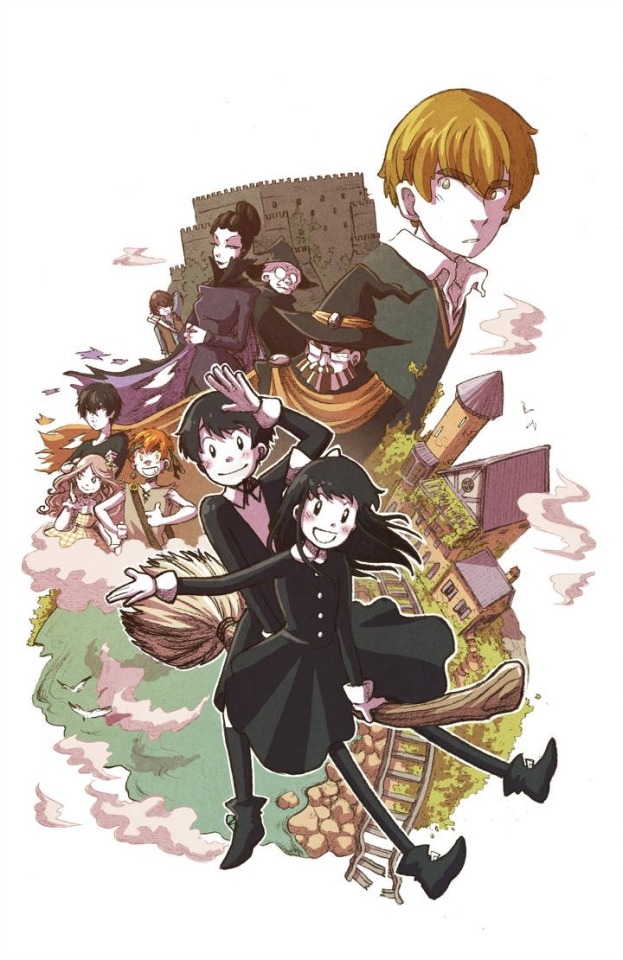
The Story
Hooky, a series so good, that if it were a manga I’d want it turned into an anime and if it were a comic I’d want it turned into a cartoon. And even as a webtoon, I just want someone to bring this to the big screens.
Its a story about many things. At its heart, it's about love and the lack thereof it (as cheesy as this sounds). Divides from distrust, lashings from hatred, misunderstandings from miscommunication all looked at different levels. From the interpersonal to the societal. Miriam weives a careful and interesting narrative on what can quickly become a complicated and controversial topic.
Its a series that starts off quaint and oh so very sweet. Akin to Disney's retelling of all the classic fairy tales.
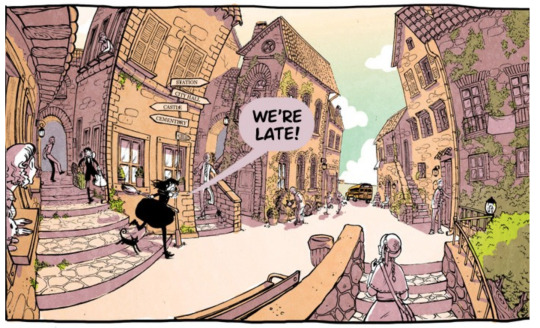
Two twins, Dani and Dorian dash through a pastel rendition of a Spanish village, dressed in matching black robes as they run late for their school bus. Upon missing their only ticket to the hidden rendition of Hogwarts this world has they have a brilliant idea to hide this from their parents. And instead, find a mentor in magic as an alternative.
From then on its a swirling adventure as these children navigate a world they’ve obviously never interacted with. It's a fairy tale - but not from Disney - that takes some interesting inspiration from the famous stories fables. Hansel and Gretel being an example which comes to mind.

Going back to comparing Hooky with Avatar - it’s a story with its high and low moments for the characters. Just like Aang, the main duo of this story, don’t always get to play around with their equivalent of Elephant koi. It’s at times grim but not overly gritty. It doesn't revel in life’s tragedies any more than it indulges in fantasy’s escapism.
Our main characters find themselves in a world they quickly realize they know very little about and it is quickly made obvious to both us the viewer and the twins, that not everything is exactly as simple as it seems to the inexperienced eyes of the child twins.
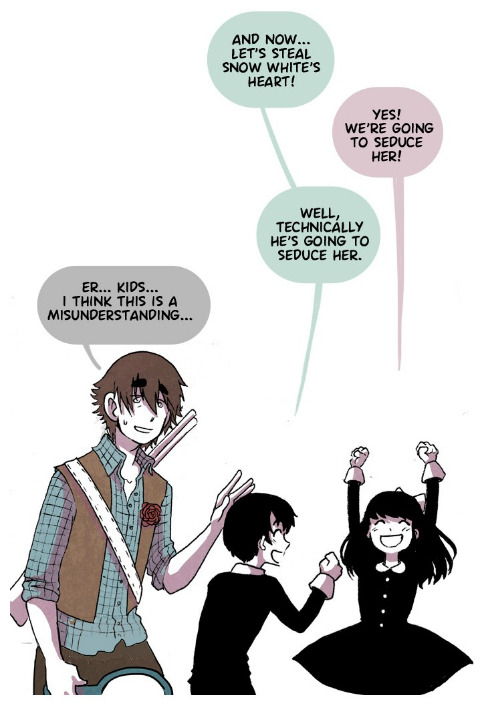
In a way, they are almost perfect reflections to us readers. Ignorant and oblivious to the reality of this open and unexplored world. Almost except for the fact that unlike them, we have some grounding story elements of the initial fables interwoven into the narrative.
Taking inspiration from a story does not mean copying it however and this is certainly true of Hooky, which is it's own grounded and fleshed out tale.
The world-building starts off in the form of little one-off lines and details which quickly snowball into a predominant feature of the story. Something that demands the attention of both you and the characters. The story and its contents evolve and mature just like the characters as they grow up both figuratively and literally.
Scenes and events happening as early as chapter one will come back later. Twists, turns, self-fulfilling prophecies - all of which given this series a wonderful re-read value (in addition to the first read-through ride).
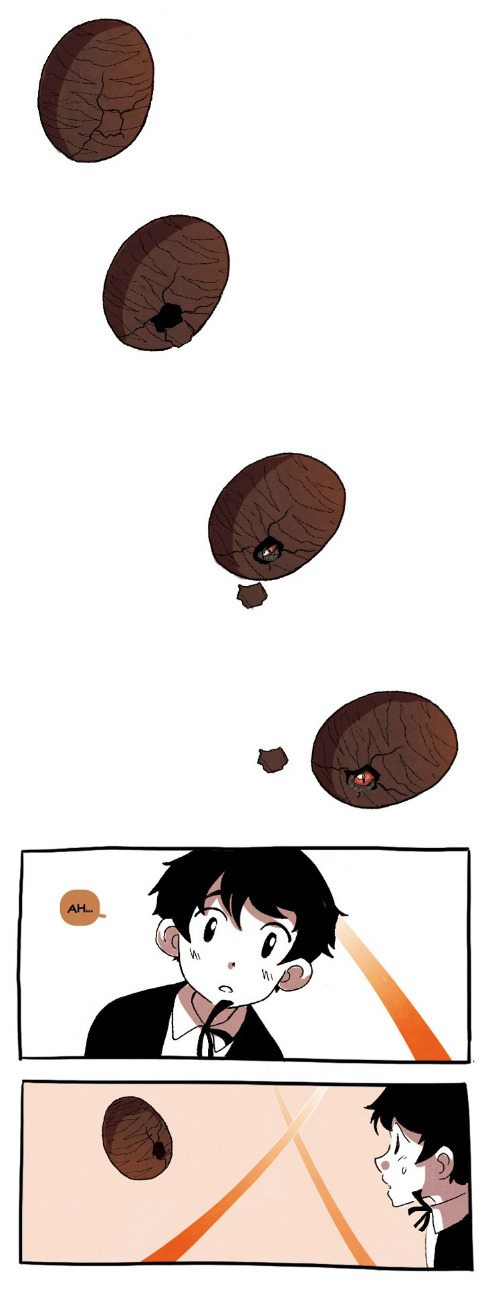
There’s so much I could say about Hooky and it’s story and storytelling. However, much of it is walled off behind intricate layers of world-building and scenes - all of which are too spoil-ery for me to justify, well, spoiling it.
Instead, I’ll move forward to another greatly quality of this story: Its characters.
The Characters
This story’s characters are much of its charm. If you can’t find yourself enjoying Dani and Dorian’s antics along with their friends - then much of this story will fall flat.
They should not though, because, every character it a well and finely crafted piece of art.
First, we have the main duo: the aforementioned twins. Both are polar opposites in character, as many twins tend to be written - but both come off as very genuine and their sibling love for each other comes across even more so.
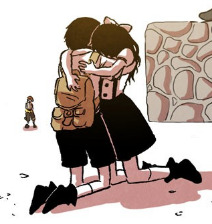
It’s the little things that make them work. The sibling bickering, the disagreements that put them at odds but eventually bring them back together. The fierce care and protectiveness they have despite this and hostility that will sprout against anyone that attacks one or the other. They won’t be finishing each other’s sentences but no one else in the world would understand their unsaid words better than they do with each other.
Dorian, the brother is the ‘book smart’, the skill. He likes to think of himself as a well-read gentleman but isn't all that prideful over it (for the most part). He doesn’t handle the more rambunctious boys his age well despite his admiration of them and needs to socialize.
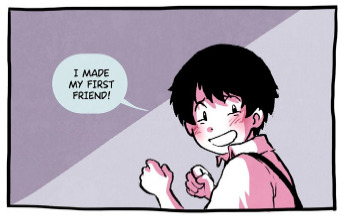
If there is one thing he’s proud and or defensive over it’s his magic. His wizard heritage and family name - no matter what the outside world’s opinion of it is hell stubbornly hold on to it. A flip side to his genuine and endearing clumsiness when friends are in the picture is the fact that he is perhaps more cynical or anxious than his sister. He’s far from perfect, but again this is due to his youth and inexperience rather than any lingering personality flaw. Throughout the story, he does many things, both good and bad - but everything he does is consistent and grounded as the individual he’s been built up to be.
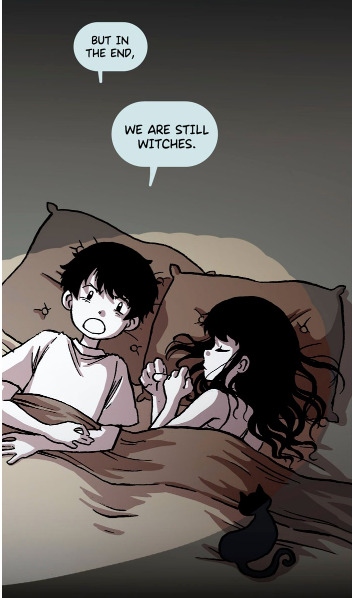
Dani is the more outgoing of the two twins, she’s more so the ‘raw power’ of the duo. Despite being just as sheltered as her brother, she’s a step ahead of her brother when facing the uncertain, confident, adventurous but rash - despite how this gets her into trouble.
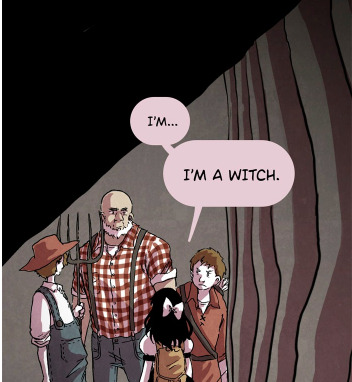
She is, however just as sensitive as her brother. In fact, all the while being more outgoing it can seem like she is more easily pressured by the views of others on her than her bother at times, the more easily influenced by the world around her.
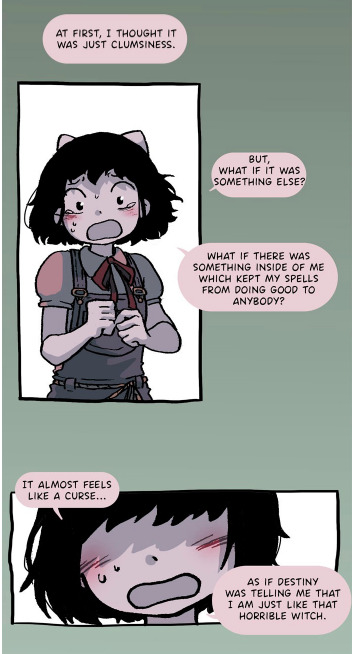
There is also a vast supporting cast of characters in addition to our interesting twin due. Some of which I doubt hesitate to even call just “side” characters with the role they continuously play.
There’s Nico, a rambunctious village boy - who just wants to properly get the chance to grow up as a wizard’s apprentice despite his ‘lack’ of ability with magic. He’s first introduced as one of those ‘rough around the edges’ individuals with a somewhat un-empathetic temperament.

As the story’s scope grows and as our characters mature with their experiences, however, Nico is quickly one of the characters who take the lead in his development. Considering where he started, he ends up one of the most grounded and wise characters.
Our next character is Princess Monica. As per her moniker - she certainly starts off impersonating her title. Stuffy, self-aggrandising, very obtuse regarding the lives of everyday people - the list goes one. Her introduction is set with her decision to embark on a quest to find her prince charming.

Just like our main character duo, she is very sheltered, however. And quickly she’ll discover that her wants and beliefs may clash with reality. This pompous air (which may annoy some readers) thankfully, does not last long. Monica quickly blooms to be one of the most empathetic and hardworking characters within the story. Her blooming relationship with Dorian is as agonisingly anxiety inducing as it is heartwarming to see.

I could talk at length about the other characters, but if I did this post would go on and on. But certainly, Mark, Alex, Damien, Will, Master Pendragon, the King, the Wytte family - all are intriguing and compelling characters which will keep you around if you’re not hooked already.
The Art
The final thing to this post is me just briefly discussing the art. If you haven't noted already from the screenshots - it’s gorgeous and unique. Here the author/artist takes full advantage of the medium provided to her. Scenes will flow down for pages, something only possible in the webtoon. Characters will talk in coloured speech bubbles, something only possible in coloured and static media such as comics.
The art in this series is nothing close to static, however. It's dynamic and inventive in its paneling in a way that brings so much charm to the series.
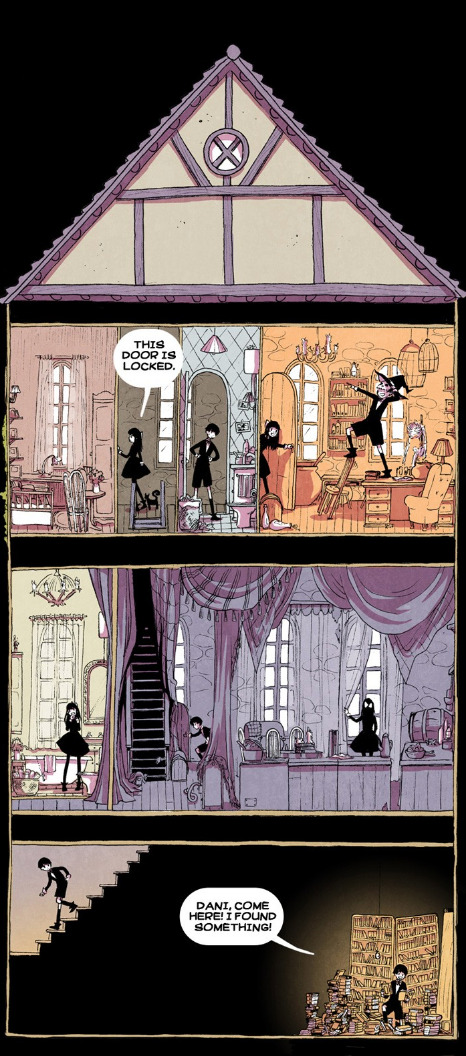
Emotional moments are that much more impactful as you, the readers, are swept through both dream-like and nightmarish scenes alike. Scenes will flow just as much as they will pause between panels, letting words and emotions soak in. They build up awe as well as they do tension and dread. The artistry of the author develops along with the story is nothing short of beautiful especially as we reach the current ending arc’s climax and denouement.



To Summarise
Hooky is a well-crafted piece of writing that I hope more people learn about and get to read. It's currently going into its final arc (as of writing this post) and I can attest that it certainly is worth the read. While as a story it enjoyed taking after the grim origins of our favourite fairy tales, it never forgets what it once was - a story about two twins just missing their school bus - and it makes sure to show the readers it hasn’t forgotten with a fairy tale ending fit for a child’s bedtime story its so sweet.
#hooky#hooky webtoon#dani hooky#dorian wytte#dorian hooky#webtoon#own post#webtoon review#webtoon recommendation#writing#storytelling#art
446 notes
·
View notes
Text
Dragon Age 100 - 6 (memory)
Summary: Despite time and distance, absence has not made the heart grow forgetful. Kaaras just can’t seem to forget Ataashi. However, perhaps he can find new memories instead with someone who is chasing the same variety of ghosts. This might be the beginning of a beautiful something.
---
Creators, that man was hot.
“Something wrong, Herald?”
Yeah, Kaaras was tripping over his fucking tongue. Try as he might, he couldn't get it to form words. It just tied itself into useless knots and hung there, mocking him in his attempts to create speech. Even small children could do it, but he was up the creek without a paddle. It was unfortunate too, considering who he was speaking with.
Dorian had settled well into Skyhold since their meeting at Redcliffe. Well, as much as a Tevene man could settle into the cold, wet mountains of Haven. He complained a good game, but he wasn't leaving. He seemed ready to stay there, snow and all.
“F-fine.”
His tongue loosened up enough to let that out, but his face burned. Apart from the one time they had nearly died together, that was about as good as it got for words whenever Dorian was around. Just one look from those eyes and Kaaras forgot how to breathe sometimes. It was downright pathetic in his humble opinion.
Damn the man for being so handsome... it had to be illegal.
“You sound half frozen to death out here. Wouldn't blame you, bloody cold.” and then the mage sneezed. “Care to head inside for a bit? It might do us both some good.”
Kaaras managed a nod, mostly because his tongue had stopped working for a second time. Wordlessly, he followed behind the man as they headed into what was the only place to get a drink in Haven. Well, on the level anyway – there was plenty of stuff that even his stomach would turn at out there. He'd stick to thing he couldn't use as ingredients in his pyrotechnics, thank you very much.
They both wound up near the fire, clutching mugs and sighing in relief at the warmth. The mead loosened up Kaaras' tongue, but he went at it slowly. Even at his size, he had to be careful. A little too much and he could slip up.
Slip up...
He shook his head, frowning. Briefly, a night past entered in his mind. It had been the same – a cold night around a fire, a mug of something to help warm up the insides, and the company of a handsome man he was hopelessly flustered around to make his face heat to boiling. If not for the time of day and location, it could have been identical.
A lead weight dropped to Kaaras' stomach as he stared down into his mug. Part of him wondered where Ataashi was. Had he survived the blast, or perished like so many in the Conclave? Neither answer appealed to him much, given their history. He could only hope he never knew as he disrupted his reflection in the mead's surface by taking a quick sip.
Not now. It had almost been a year and a half since that night.
“It's good to get out of that cold. I thought my brain was going to freeze over.” Dorian had settled into his own drink, reminding Kaaras of a cat curled up by the fire. “I'm going to hope you weren't the one who picked Haven, Herald.”
The qunari winced as he set his drink down. “You can call me Kaaras, you know. Or Adaar if that's too personal.”
Anything but Herald. People shouted it at him so many times that he was starting to forget his own damn name. And that was pretty ridiculous – he had picked it himself after all. If someone other than his family used it, then he would be a happy man.
Dorian nodded as he put his mug down after taking a quiet sip. “Very well, but that still doesn't answer if I get to blame you for the cold.”
His eyes were twinkling and it wasn't the mead that made Kaaras' stomach flop. It wasn't the cold making his face feel so hot. Instead, it was the way Dorian was looking at him. That wasn't platonic friendliness – even he knew that one.
That weight sunk lower as he recalled how someone else used to look at him that way. The eyes were different colors, and the gaze higher, but they had both held the same interest and promise. Maybe soon, it would fade just as fast.
He could only hope it would be fast – his heart couldn't take another year of hoping for nothing but cold glares and empty tents.
Still, he faked a smile as he nodded. “Don't worry, I had no choice in the matter – just happened to get blown up here.”
“Right, surviving the Conclave and all that. You're a lucky man, Kaaras.” That Tevene accent did terrible, wonderful things to his name. “And I suppose I'm lucky you didn't kick me out the first chance you had. Your commander doesn't like me much.”
A snort leaked out before Kaaras could control it. “He doesn't like me much either if it helps.”
And there was that look again as Dorian took a sip of his drink. “I can't imagine why, a charming fellow such as yourself. Haven seems charmed by you.”
Charmed, or just amazed a qunari could be so short and ginger? Kaaras really wasn't sure anymore. As long as he closed the rifts, they probably didn't mind him. Once it got out who he had sided with? He doubted they would be as accepting. After all, his companions had already chewed him out and then some for his decision. To say he was getting the cold shoulder some places was putting it mildly.
Oh well... at least his family still liked him.
“I'm going to say the Templar supporters are rather cursed by my presence instead.” He took another sip of his mead, the alcohol burning his throat as it went own. “Can't say I mind the loss much.”
It was loosening his tongue – must've been strong stuff. That or he hadn't had a drink in a very long time. What little tolerance he had built up was already fading apparently. That did not bode well for the conversation. He knew what he was like when he got drunk, and the last thing Dorian needed was an overly affectionate qunari.
He still tried to block that one out...
“No, I wouldn't be surprised at that given your background.” There was a strange note to Dorian's voice that could have almost been approval as he placed his drink back on the table. The twinkle in his eyes was even stronger now. “You're not one to do things the easy way, are you?”
No... and Dorian wasn't the first one to say it. Often his former tent mate and partner had mentioned his hard head and eye for detail often left him working late into the night. Even if there was an easier solution, he did things his way. According to Ataashi, that had been one of his strong suits. It also caused him to have a stick up his ass – also Ataashi – but he could ignore that.
There he went again... thinking about the qunari. It was hard not to as his body went through familiar motions. The two men couldn't have been more different, but it was something about their eyes that had Kaaras thinking back to late nights around a fire before everything had gone to hell. Maybe it would always be that way.
“Are you alright, Kaaras? You look like you're in pain.”
Dorian's thoughts drove him back to the present, away from roaring fires on cold nights out in the open. Kaaras blinked back into focus, pushing old ghosts aside. Even he knew he was being rude now by ignoring the other man. He could mope later.
“Fine. I guess my hand is acting up a bit.”
It wasn't a lie – the damn thing hurt. He had just grown used to it as it continued to progress. But Dorian didn't know that yet, so it was a useful excuse. Best of all, it got his mind off unpleasant details as he continued to nurse his mead.
The man frowned, and for a brief second he went to reach out. Something stopped him in the end – he almost flinched. However, he covered up well and made it look more like a shiver. If Kaaras wasn't so tuned to his close vision, he would have missed it.
Apparently someone else was dodging memories that night.
“You should see a healer if it continues to bother you. After all, you're left handed.” Dorian finished his drink perhaps a little too fast for someone at ease. “I should get going.”
He rose, but he didn't move away. Their eyes met briefly – there were ghosts there that the mage didn't want to talk about either. Kaaras' heart ached for him as he stood as well, tossing down the rest of his mead in a move that would've made Akri proud. He was definitely going to feel that one in the morning.
“Dorian, I -” He paused, trying to find the right words. “Thank you for talking with me. It was nice to get out of my head for once.”
A smile returned to the man's face as he nodded his head. It was softer than the ones he normally gave – perhaps a bit more genuine. “Well, if you need my services again, do let me know. It's not every day I get to speak with someone with your skill set.”
Whatever that was, Kaaras didn't know and maybe he didn't need to right then. He was good to just watch the man go, back into the cold he hated so much. Maybe he should have followed after, but he knew what it was like to chase ghosts. It was best done alone, until he would be ready to talk about it. Maybe they could speak on it together one day.
The memories still hung as he left the tavern on his own, but perhaps they were starting to lose their bite. In time, perhaps better ones would fill them. Until then, he would just have to keep trying to force them back.
And.. maybe grab another drink with Dorian some time. After all, it wasn't every day he got to chat up a devastatingly handsome necromancer.
1 note
·
View note
Text
(HOT TAKE) Notes on a Conditional Form by The 1975, part 1
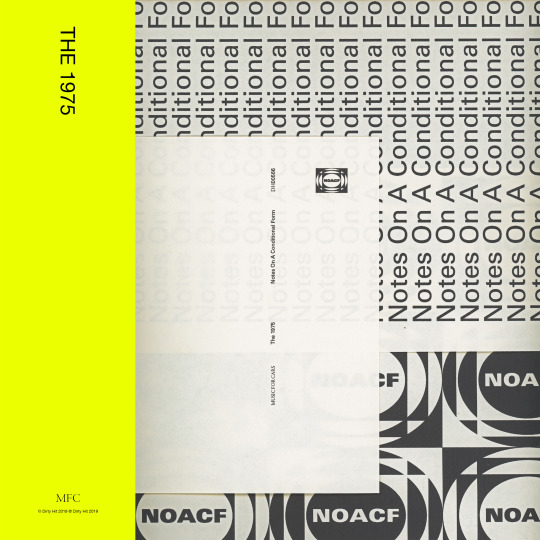
In the first instalment of a two part dialogic HOT TAKE of The 1975′s latest album, Notes on a Conditional Form (Dirty Hit, 2020), Maria Sledmere writes to musician and critic Scott Morrison with meditations on the controversial motormouth and prince of sincerity that is Matty Healy, the poetics of wrongness, millennial digression and what it means to play and compose from the middle.
Dear Scott,
> So we have agreed to write something on The 1975’s fourth studio album, Notes on a Conditional Form (Dirty Hit/Polydor). I have been traipsing around the various necropoli of Glasgow on my state-sanctioned walks this week, listening to the long meandering 80-minute world of it, disentangling my headphones from the overgrown ferns, caught between the living and dead. Can you have a long world, a sprawling fantasia, when ‘the world’ feels increasingly shortened, small, boiled down to its ‘essentials’? Let’s go around the world in 80 minutes, the band seem to say, take this short-circuit to the infinite with me. I like that; I don’t even need a boat, just a half-arsed WiFi connection and a will to download. I’m really excited to be talking with you, writing you both about this; it’s an honour to connect our thoughts. I want writing right now to feel a bit like listening, so I write this listening. When my friend Katy slid into my DMs on a Monday morning with ‘omg the 1975 album starts with greta?????????’ and then ‘what on earth is the genre of this album ?!’ I just knew it had to happen, this writing-listening, because I was equally alarmed and charmed by the cognitive dissonance of that fall from Greta’s soft, yet urgent call to rebel (‘The 1975’), into ‘People’ with its parodic refrain of post-punk hedonism that would eat Fat White Family on a Dadaesque meal-deal platter ‘WELL, GIRLS, FOOD, GEAR [...] Yeah, woo, yeah, that’s right’. Scott, you and I went to see The 1975 play at the Hydro on the 1st of March, my last gig before lockdown. I’d been up all night drinking straight gin and doing cartwheels and crying on my friend’s carpet, and the sleeplessness made everything all the more lush and intense. Those slogans, the theatrical backdrops, the dancers, the lights, the travellator! Everything so EXTRA, what a JOURNEY. And well, it would be rude of me not to invite you to contribute to this conversation, as a thank you for the ticket but also because of your fortunate (and probably unusual) positioning as both a classically trained musician (with a fine-tuned listening ear) and fervent fan of the band (readers, Scott messaged me with pictures of pre-ordered vinyl to prove it).
> It seems impossible to begin this dialogue without first addressing the FRAUGHT and oft~problematic question of Matty Healy, the band’s frontman, variously described as ‘the enfant terrible of pop-rock’ and ‘outspoken avatar’ (Sam Sodomsky, Pitchfork), ‘enigmatic deity’ (Douglas Greenwood for i-D), ‘a charismatic thirty-one-year-old’ and ‘scrawny’, rock star ‘archetype’, not to mention ‘avatar of modern authenticity, wit, and flamboyance’ (Carrie Battan, The New Yorker). ‘Divisive motormouth or voice of a generation?’ asks Dorian Lynskey with (fair enough) somewhat tired provocation in The Guardian, as if you could have one without the other, these days. ‘There are’, writes Dan Stubbs for The NME, ‘as many Matty Healys here as there are musical styles’. So far, so postmodern, so elliptical, so everything/yeah/woo/whatever/that’s right. Come to think of it, it makes sense for The 1975 to draft in Greta Thunberg to read her climate speech over the opening eponymous track. Both Matty and Greta, for divergent yet somehow intersecting reasons, suffer the troublesome, universalising label of voice of a generation. Why not join forces to exploit this label, to put out a message? I’ve always thought of pop music as a kind of potential broadcast, a hypnotic, smooth space for desire’s traversal and recalibration. More on that later, maybe. What do you think?
youtube
> You can imagine Matty leaping out of a cryptic, post-internet Cocteau novelette (if not then straight onto James Cordon’s studio desk), emoji streaming from his fingertips like the lightning that Justine wields in Lars von Trier’s film Melancholia (2011); but the terrifying candour of the enfant terrible is also his propensity to wax lyrical on another (bear with my clickhole) YouTube interview about his thoughts on Situationism and the Snapchat generation. It feels relevant to mention cinema right now, if only in passing, because this album is full of cinematic moments: strings and swells worthy of Weyes Blood’s latest paean to the movies, but also a Disneyfication of sentiment clotted and packed between house tracks, ballads and rarefied indie hits. Nobody does the interlude quite like The 1975. Maybe more on that later, also.
> Where do I start though, how to really write about this, how to attain something like necessary distance in the space of a writing-listening? Matty Healy, I suppose, like SPAM’s celebrated authorial mascot, Tom McCarthy, poses the same problem of response: how to write about an artist whose own critical commentary is like an eloquent, overzealous and self-devouring, carnivorous vine of opinion?
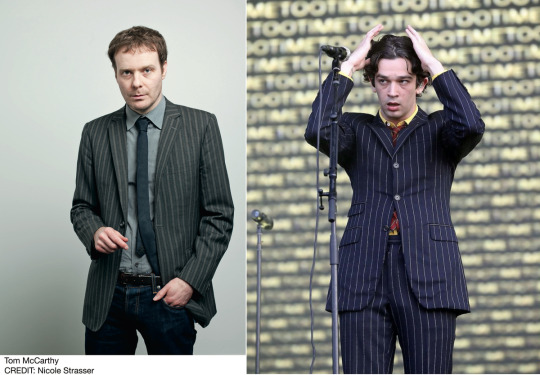
> Now, let’s not turn this into a discussion about who wears pinstripes better (we can leave that to readers - these are total Notes from the Watercooler levels of quiche). There seems to be this obsession with pinning (excuse the pun) Matty down to a flat surface of multiples: a moodboard, avatar, placeholder for automatic cancellation. He’s the soft cork you wanna prod your anxieties through and call it identity, you wanna provoke into saying something bizarrely, painfully true about life ‘as it is now’. Healy himself quips self-referentially, ‘a millennial that babyboomers like’. I don’t really know where to start really, not even on Matty; my brain is all over the place and I can’t find a critical place to settle. I’m lost in the fog and the stripes, some stars also; I haven’t even washed my hair for a week. Funnily enough, in 2018 for SPAM’s #7 Prom Date issue I wrote a poem called ‘Just Messing Around’ where the speaker mentions ‘pinning my eye to the right side / of matt healy’s hair all shaved / & serene’ and you don’t really know if it’s the eye that’s shaved or the hair, but both I guess offer different kinds of vision. Every time I google the man, IRL Matty I mean, I am offered a candied proliferation of alluring headlines: ‘The 1975’s Matty Healy opens up on his beef with Imagine Dragons’, ‘The 1975’s Matty Healy savagely destroys Maroon 5 over plagiarism claims’. Perhaps the whole point is to define (or slay?) by negation. Hey, I’ll write another poem. The opening sentence comes from Matty’s recent Guardian interview.
Superstar
I’m not an avocado, not everyone thinks I’m amazing. That’s why they call me the avocado, baby was a song released by Los Campesinos! in 2013, same year as the 1975’s debut. In the am I have been wanting to listen and Andy puts up a meme like ‘The 1975 names their albums stuff like “A Treatise on Epistemological Suffering” and then spends 2 hours singing about how hard it is to be 26’ and I reply being 26 IS epistemological suffering (isn’t that the affirmative dismissal contained in the title, ‘Yeah I Know’) I mean only yesterday I had to ask myself if it’s true you can wish on 11:11 or take zinc to improve your immune system or use an expired provisional license to buy alcohol like why are they even still asking I thought indie had died after that excruciating Hadouken! song called ‘Superstar’ which was all like You don’t like my scene / You don’t like my song / Well, if you Somewhere I’ve done something wrong it seems a delirious, 3-minute scold of the retro infinitude of scarf-wearing cunts with haircuts, and yeah sure kids dressed as emos rapping to rave is not the end of the world, per se, similarly I had to ask myself is there a life in academia is there a wage here or there, like the Talking Heads song And you may ask yourself, well How did I get here? Good thing I turn 27 next month Timothy Morton often uses the refrain, this is not my beautiful house this is not my beautiful wife to refer to those moments you find yourself caught in the irony loop and that’s dark ecology the closer you are the stranger it feels like slice me in half I’ll fall out with more questions you can plant in the soil like a stone or stoner, just one more drag of does it offend you, yeah? will I live and die in a band Matty sings the sweet green meat of my much-too-old -and-such-youthful experience of adding healthy fat to conference dialogue, like ‘Avocado, Baby’ was released on a record called No Blues I believe a large automobile is hurtling towards me now in negative space and the driver is crooning Elvis and reciting my funding conditions and everything feels like there aren’t not still people who believe the new culture of content is a space ‘over there’ and you can still have earnest power ballads about love if you want them =/ to cancel (too many tabs don’t make a tableau but in the future facebook has a paywall) and fame is a drag the pressure we put on the atmosphere, like somewhere you’re alive and still amazing asking wtf I’m reading this novel by Roberto Bolaño set partly in 1975 before we had internet it seems poets got laid a lot that year in Mexico City before I was born to pick up video calls with a spliff in one hand in the splendid, essential heat like a difficult knife in my side you can put me on toast, grind the pepper over me gently and say fucking hell this has taken forever.
> I guess I want or wanted to begin with this question of difficulty that rises when responding to Notes on a Conditional Form. How do you approach an album whose delayed release places it in a position of considerable hype, an album whose world tour and promotion is again delayed by global pandemic, an album shrouded in the ever-shifting controversy of Matty’s persona, an album whose length and sonic variety risks collapse into litanies of zany superlative and necrophilic attempts to revive musical category as vaguely relevant here? As beautiful as it is to catalogue the offbeat Pinegrove vibes of ‘Roadkill’, the shoegaze croons of ‘Then Because She Goes’ and the pop-punk, chord-bright euphoria of ‘Me & You Together Song’, I could keep going and going with this. I could just list and just list this. The album is a generous offering: a tribute to the album as form in an age where attention tapers away on high-streaming playlists set to conditioned, circadian moods curated by the likes of Spotify or Apple Music. The album is a Borgesian plenitude of multiple pathways, multiple timelines, infinite feed, choose your own adventure; a hypertext of cultural reference almost worthy of Manic Street Preachers at their Richey Edwards era of paranoid, intellectual peak; a metamodernist feat of oscillation between irony and sincerity, an extended tract, a drunk millennial ramble, a journey that loops from house party to club basement to the streams of sexuality repressed and expressed encounter...and yet. It is both more and less than these things. In trying to capture Notes on a Conditional Form with some pithy, journalist’s statement, I’m doing it all wrong.
> Sidenote: I recently listened to Rachel Zucker give a 2016 lecture on ‘The Poetics of Wrongness’ as part of the Bagley Wright Lecture Series. She makes a case for wrongness in poetry and critique, rejects the poem of pithy essence, the short, pretty and to the point lyric whose meaning is easily digested in a greetings card, or A Level exam paper, say. ‘Instead of the Fabergé egg of the short lyric, I prefer the aesthetics of intractability and exhausted exhaustedness’, the mistakes, lags or aporia made along the way in one of these long and winding poems. Notes on a Conditional Form is full of what some might deem mistakes, digression, exhaustion; but it is also peppered with the gloss of almost perfect pop ‘hits’ such as ‘Me & You Together Song’ and ‘If You’re Too Shy (Let Me Know)’. A wrong poem should be, ‘ashamed and irreverent’, which feels like a decent description of The 1975’s general orientation towards artistic conception. There is cringe and incongruity, there is by all intents and purposes ‘too much of it’, whatever we mean by ‘it’. And yet, that is its beautiful poetics of wrongness, the sound of wrongness, which ‘prefers the stairs’ to the easy elevator pitch (as Zucker puts it), that ‘prefers a half-finishing crumbling stairwell to nowhere’. I like to think about this 1975 album as a kind of exhausting Escherian scene of shifting, crumbling stairwells, shuffling and reassembling against the glistering backdrop of the internet’s inverse void, where everything, literally everything is translated to a starry excess of 1s and 0s, our collective binary data, the white hot, unreadable howl of our noise. What do you think Scott, would Matty find this image agreeable? Does that matter?
> Pushing dear Matty aside, say what you like, let’s start (again) with the title: Notes on a Conditional Form. Following 2018’s A Brief Inquiry Into Online Relationships, it’s fair to position these records as gestures towards philosophical statements ‘of the times’. Important to recognise the resistance to total or dominating knowledge built into the titles: these are not complete tracts or theses, but rather ‘a brief inquiry’ and ‘notes’. It’s obviously the ancient yet *hip* thing to do in capital-P Philosophy, to put out your statement on aesthetics and ethics, and I think The 1975 are playing with that tradition and its failure. You can imagine if his attention span were different, Matty Healy would’ve already written a PhD thesis on this stuff and published it as drunken bulletins on LiveJournal in 2007. As it stands, we have the smorgasbord sprawl of this eclectic record to get through in this cursèd year of 2020 — it’s not like we have much of anything better to do right now, when everything feels so futile, beyond reason and even the greatest human endeavour. Haha, woo, Yeah :’(((.
> Let’s stay in that conditional space between crying and laughter. Conditional form is interesting as a term, often used in grammar to refer to the ‘unreal past’ because it uses a past tense but does not actually refer to something that literally happened in the past: If I had texted him back, we would probably have gone to the gig that night. There’s something about the conditional as the ur-condition of the internet, the proliferating possibilities it offers and the hauntological strains of what could have been had we chosen x option over y, z, a, b, c, infinity...As millennials, we often make decisions by hedging, always caught in the conditional state of what it is to be. Hovering in the emotional shortcuts provided by dumb yellow icons, the poetics of abstraction. A verb form’s dalliance with uncertain reverb; and so we live our conditional lives.
> To push this further, we can say the internet is, as ever, Matty Healy’s natural habitat. In a recent podcast interview with Conor Oberst for The Face, Healy tells his favourite emo-country hero that ‘my natural environment by the time I started The 1975 was the fucking internet’. So how does that ecosystem play into the music? In a damning review for The Line of Best Fit, Claire Biddles concludes:
The 1975’s first three albums are ideal and distinct worlds to inhabit, each individually cohesive but situated in specific contexts — the anticipation of the small town, profundity in the face of vacuous fame, and the horror and isolation of late capitalism. Perhaps because of its broken genesis, Notes has no such common context, and ends up feeling flat, directionless and inessential, where its forebears felt vital, worthy of devoting a life to. For a band with proven dexterity in deftly capturing the nuances and quick changes of contemporary conversation, it is disheartening to witness them with nearly nothing of note to say.
That description — ‘flat, directionless and inessential’ — is kind of how I experience the internet right now, in the paradox of Web 2.0 becoming utterly essential, somehow, to how I live my life, how I love, how I am with friends. The internet as my ecosystem, my utility, my complete environment, my Imaginary — beyond the mere utility of a WiFi connection. Broken genesis might well describe the childhoods of those of us who grew up online, whose platforms collapsed around them, whose adolescent data was lost in the great ~accidental annihilation of the MySpace servers, whose identities were always already fractured, performed, anonymised or exquisitely personalised, deferred into only the (im)possible keystroke of utterance and trace, the fort-da play of MSN sign-ins. ‘My life is defined by a desire to be outward followed by a fear of being seen’, Matty says in a new short film for Apple Music, released in tandem with the album. The internet requires this chiaroscuro destiny: not to burn always with Baudelaire’s hard and gem-like flame (O to be an IRL flaneur beyond times of lockdown) but to endlessly flicker between the bright green light of presence and the shade of what once was called afk, away from keyboard. To live and burn in the gap between extroversion and introversion, to live in this conditional state of tendency. To express with emoji, send pics, is to both reveal and withhold something else, essential.
> I like albums to feel like worlds; I appreciate Biddles’ evocation of the cohesion experienced in the first three 1975 records. But perhaps it is a kind of violence to assume a world must have cohesion to exist. What is even meant by ‘common context’? What pressure are we putting on a singer, a band, a cultural moment to produce something familiar and harmonious, and to whom, at what scale? What does it mean to be the biggest band in the world...for a bit? How does that work when everything is dissonance, transience, noise, interference; both this and not-this; when life itself is lived as the flat traversal of a millioning existential terrains that seem to collapse into this nowness in which I feel myself sliding forever? Can anyone weigh-in on what it means to make music, art or writing that’s ‘worthy of devoting a life to’, because the gravity and force of that condition for good art, good pop, seduces me so.
> Maybe the point is to always be in the middle, to never quite start to write about The 1975, to find yourself always already writing about this album because this album was always already writing about your life. I have said nobody does the interlude quite like The 1975, but I was being coy, because the hottest twentieth-century philosophical double act, Deleuze and Guattari (haters gonna hate), do the interlude rather nicely. The point of a rhizome being ‘no beginning or end [...] always in the middle, between things, interbeing, intermezzo’ as they write in A Thousand Plateaus (1980). I see the musical interlude of a pop record, the instrumental moment without lyric, as a kind of middling gesture that places the listener in that conditional state of presence and absence, a hinge between songs, times and narrative moments. Maybe my favourite moment in A Thousand Plateaus is the statement: ‘RHIZOMATICS = POP ANALYSIS, even if the people have other things to do besides read it, even if the blocks of academic culture or pseudoscien-tificity in it are still too painful or ponderous’. Painful or ponderous might be a fair critique levelled at the enfant terrible vibes of Matty’s lyrics and generic pick’n’mix, but isn’t this tactic a kind of swerving punch at the categorical violence that keeps people out of academia, that keeps academic discourse so often stale in the first place? Unlike most journal articles, let’s face it, pop reaches ‘“the people”’. Perhaps Notes on a Conditional Form is the rhizomatic sprawl of the myriad we need as an alternative to institutional hierarchy, ring-fencing and the language games of academia. Surely the title is a reference to the very ‘pseudoscient-tificity’ D&G mention? I’m gonna quote Richard Scott’s blurb to Colin Herd’s 2019 poetry collection, You Name It here (not least because the indie publishers, Dostoyevsky Wannabe, come straight out of Manchester, home to The 1975, and because Herd’s poetic spirit is pure pop generosity with a platter of theory on the side), because I want to say similar things of this album: ‘Colin Herd’s poems are masterpieces of variousness. They are talismans against Macho demons. They are snatches of theory operating under lavish spills of language’. The good thing about Herd’s poetry and Matty Healy’s lyrics is that the impulse towards romantic or florid expression is always tapered by an interest in the mundane and everyday. Healy is always singing about pissing or buying clothes online or, as on ‘The Birthday Party’, singing about ‘a place I’ve been going’ that seems to consist of the lonely, infinite regress of conversations about seeing friends and watching someone drink kombucha while buying, in the convenient life of rhyme, Ed Ruscha prints.
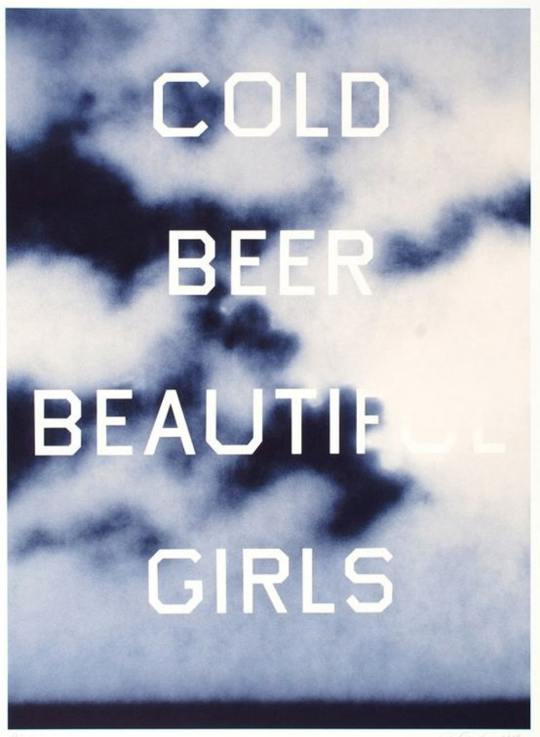
Ed Ruscher, Cold Beer, Beautiful Girls (2009)
> So what kind of listening does this rhizomatic sprawl demand — does it expand beyond the banal or find a holding space there, a heaven of affect chilled to late-modernity’s crisp perfection? ‘The End (Music For Cars)’ is a luxurious, Hollywood ‘soaring’ moment, all strings and swells, fucking woodwind, and comes as the third track on the album, where normally you’d place it as some kind of penultimate climax, the album’s landscape pan-out or big swelling screen kiss in three-dimensional rotation. The band’s ‘Music For Cars’ era comprises their two most recent records, and you have to take it as a nod to Brian Eno’s 1978 ambient classic Ambient 1: Music for Airports (Matty recently interviewed Eno again for The Face, cool). The thing about cars is you drive around in them, you follow rules but also whims and desires, convictions; you choose to join others or you pursue the selfish acceleration (‘People are afraid to merge on freeways in Los Angeles’ goes the laconic teenage refrain in Bret Easton Ellis’ 1985 debut novel Less Than Zero). You only listen to music half-attentively; you don’t listen close enough to trade in souls. Are we being invited to experience this album as an ambient disruption of figure and ground, presence and absence, here and there, space and place, intimacy and despondency? Driving feels increasingly ‘directionless and inessential’ when the scale effects and obscenities of the anthropocene, of covid and other late-capitalist crises loom in our vision, when the sign systems we used to navigate our lives by seem to shimmer out of focus, or pixelate and deteriorate through endless memetic replication... You can’t help feel like Biddles review kind of misses the point.
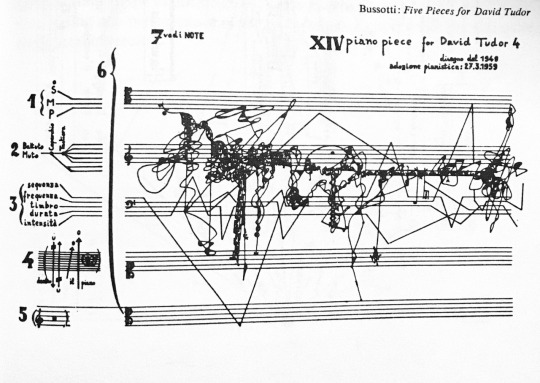
Sylvano Bussoti, Five Pieces for Piano for David Tudor (1959)
> What point would that be though, in a world of rhizomatic overlap and intersecting, middling lines, a direction without seeming end? I love the approximation at work when Biddles writes, ‘with nearly nothing of note to say’, because that seems to be a possibility condition for writing in the age of the internet. To write in a way that is almost less than zero and loop back upon some kind of infinity, yet keep it in 2-step. I think back to Rachel Zucker’s image of the half-finished crumbling stairwell, and feel an amiable sense of approval towards this band who always work between the registers of diary, confession, advertising, provocative sloganeering and faux-didactics, never quite settling in to specifically tell you this particular story. It’s all mess, and it’s awful and delicious, I’m sorry. ‘Nothing Revealed / Everything Denied’ is the title of track 13 on the album: that movement between nothing and everything feels like the absolutist, absurdist conditions of ‘truth’ possibility in the Trumpocene/age of so-called ‘post-truth’. ‘Life feels like a lie, I need something to be true’, Healy sings with strained conviction in the song’s opening. But what is at stake in this truth? ‘I never fucked in a car, I was lying’, goes the line, referring back to the dramatic in medias res opening to ‘Love It If We Made It’, notable banger from A Brief Inquiry…: ‘We’re fucking in a car, shooting heroin / Saying controversial things just for the hell of it’. If lying is a pun on telling a mistruth or laying back, practically sexless in a passive state, there’s a deliberate play on apathy, agency and distortion here. It’s something Matty seems snagged on. On ‘I Like America & America Likes Me’ he collapses aesthetic superficiality, capital’s lyric abstraction (‘Oh, what’s a fiver?’) and generalised crisis into this (un)conscious desire for shutdown, expressed in fragmentary bullets of needing-to-know-and-not-know: ‘Is that designer? Is that on fire? Am I a liar? Oh, will this help me lay down?’ And then that impassioned refrain, processed through vocal distortion as if to enact the difficulty in clarity as overcome somehow by the sheer making of noise: ‘Belief and saying something / And saying something / And saying something’. It’s the endless, driving recursion of our lives online, online.
> Back to ‘The End (Music for Cars)’ which really is the middle of the beginning. It’s weird to listen to songs about driving and lying down in the middle of lockdown, drowning in the bloat of social media, on top of our ongoing climate emergency (yeah, remember that, it’s still happening), where high-carbon travel feels like an exhausted, almost impossible concept. A musician complaining about travelling is an age-old subject for a song, but this feels just as much about living in the in-between times of the internet (remember the sweet naivety of the information superhighway) as much as the great Road, for which Kerouac longed as much as Springsteen, Dylan, or Lana Del Rey. Is Matty Healy homesick though? ‘Get somewhere, change my mind, eh / Get somewhere but don’t find it / I don’t find what I’m looking for’. It’s all ‘(out there)’ as the parenthetical refrain goes, but maybe ‘out there’, outside, is the maddening supplement, as Derrida would say, to our lives online, thus revealing their mutual, entwined dependency. Imagine the M6 but tangled up crazily, zanily, like one of those Sylvano Bussoti scores. It’s not like you’re trying to get home, get back, exactly. It’s not like you can just click back on your browser and erase that trace of the touch that enacts it. That’s the weird-ass sensation of being an ecological being: ‘Wherever you go, there you are’, writes Tim Morton in Being Ecological (2018). We’re all pretty alien, even to ourselves.
> If life feels like a lie, as Matty sings, does it matter anymore whether it is or not? Or, to pose the question differently, how do we feel into, attune to something like ‘truth’, a shared reality or feeling? ‘Out there’ is only a state of ellipsis [...] a vine extended, something for the listener, user, consumer and/or human to cling to — or be strangled by. In the aforementioned Apple Music video, Matty takes away the canvas and presents the frame beneath, in a gesture that is comically overwrought with Duchampian pretention around the state and context of the artwork itself. ‘Sometimes I think what is the point of...it’s not my atheism coming out, it’s just my being human coming out’, he muses. The phrase ‘coming out’, with its connotations of closeting, shame and cocoon-like emergence is intriguing here. In a dehumanising, post-internet world of neoliberalism and its attendant microfascisms, its commodification of all kinds of art, its easythink translation of poetry-to-advertising, what would it mean to come out as human after, or better still, in the middle of all this? It’s significant that he trails off after ‘the point of…’, for surely the point itself (of the art?) would be to find yourself here, there, right in the middle of it all. And then in ‘Nothing Revealed / Everything Denied’, it’s like Matty is calling us back from that epistemological and ontological boiling point of knowing and being, like in singing we could go along, we could feel present and ‘true’ again, even with friction and difference. We gotta take hold, cool ourselves down from the rhetoric and into warm emotion, the smell of paint, erotic vibration of bass, in a manner of speaking.
> What if the mode of inquiry were not to investigate but rather to follow the lines of flight, to riff on this world where narrative arcs and chains are replaced by the multiple possibilities of hallucinatory experience, what Deleuze and Guattari call ‘a continuous, self-vibrating region of intensities whose development avoids any orientation toward a culmination point or external end’? To just desire and trace it. This, Scott, is where you come in (and I finally shut up to listen). There is so much more to write about this album, echo for echo, and I feel like I’ve only begun the tracing which was already beginning: I want to know your thoughts on The 1975 and America, on gender and genre, on bodies and football and friendship, on political engagement, those house beats, on the beautiful, sultry appearance of Phoebe (fucking) Bridgers, on sincerity, on the question of ‘What Should I Say’...It’s been playing on my mind that I will never say what I want to, or should, or would say of this album, but this perhaps is what I would otherwise have said. I give you my notes in conditional form.
Read part 2 of our review in Scott Morrison’s response here.
Notes on a Conditional Form is out now and available to order.
~
Text: Maria Sledmere
Published: 23/6/20
#review#reviews#music reviews#album review#The 1975#Matty Healy#Maria Sledmere#music criticism#Scott Morrison
0 notes
Text
A couple of days ago (on Wednesday) I went to the House of Commons for a Slimming World reception hosted by Baroness Benjamin.

I know her better as Floella – because throughout my childhood she was a huge presence on children’s television – and also a quiet beacon (although I never really recognised it at the time) for racial diversity on a BBC that was largely populated by white men.
In person she’s quite something.
She seems eternally youthful – and possesses seemingly endless energy. During the two hours I was next to or near by her she never appeared to be anything less than continually animated and engaging.
Even when I presented myself in front of her and gushingly shook her hand later in the afternoon she was gracious and cheerful.
This was despite me making a ham fisted Oscar Wilde reference regarding whether or not she had a picture of herself at home going mouldy in the loft (the Picture of Dorian Grey).
Bless her.
She just stared blankly at me and unleashed a huge smile before warmly hugging me.

Despite my clearly refined sense of humour falling largely on deaf ears with Floella the day went well and the themes she raised clearly resonated with many in the room.
The topic was the startling increase in childhood obesity (something Floealla is extremely passionate about – she’s heavily involved in related charities) and what the government are doing to look at this from a strategic perspective.

There were a few speeches – from the great and good within Slimming World and also the a representative from government.
In no particular order we heard from the young slimmer of the year Charlotte Randall (link) (Instagram), 2017’s Top Target Consultant from Warwickshire Jodie Rigby-Mee (link) (Instagram) Slimming World’s head of external affairs Jenny Craven (link) and Conservative MP Andrew Selous (link) speaking as part of the health and social care committee.

I met a lot of people and shook a lot of hands, discussing many topics that were important to me and listening to other people’s opinions on what mattered to them.
There was also something of a treat for me – because one of the more personally interesting people I bumped into was a guy called Kennneth Fox. He’s an emeritus Professor at Bristol University (link) and has written and consulted extensively on the links between physical activity and psychological wellbeing.
These are subjects that have become very close to my heart – and I know from first hand experience how activity can change physical and emotional darkness into hopeful rays of light.
Kenneth has been working with Slimming World for around 20 years and (I discovered) was heavily involved in formulating their ‘Body Magic‘ plan.
For those unfamiliar with Slimming World this part of the plan aims to encourage members to get involved in regular exercise – and in its literature illustrates the benefits it can have when combined with healthy eating.
I’m proudly a Platinum Body Magic certificate holder.
I chatted to him and his lovely wife for quite a while – but finally I couldnt resist asking him about a burning question that had been on my mind from the moment I saw his name badge.
I wanted to know (when he had come into contact with people such as myself that have had extreme weight loss) how their heart health was afterwards.
What did he think about my resting heart rate?
Very encouragingly Ken didn’t seem at all surprised my my RHR (which readers will know has been a minor preoccupation of mine for a while since it’s typically 40bpm).
When I told him that I ‘only’ walked (as opposed to spending ages in the gym, running marathons or climbing mountains) he replied with ‘Well I bet that you don’t walk slowly.’
‘No I don’t. Not any more anyway.’ I replied.
‘I tend to be quite brisk.’
‘You’d be surprised how quickly the heart reacts to moderate increases in exercise.’ He said.
‘It can drop down to the mid forties in next to no time – and what you’ve been doing probably has much more in common with the heart profile of an athlete than you realise. Regular cardio activity has an almost immediate corresponding impact on heart health.’
He sipped his red wine thoughtfully and watched my response.
I was listening intently.
‘When I get into my fitness my resting rate quickly drops into the forties.’ He continued, smiling at me.
I nodded. He was telling me just what I needed to hear.
This was really encouraging – because my GP had said that he had next to no experience of extreme weight loss and how it affects the body. Therefore (despite his assurances last week that my RHR was normal) I’ve still remained a little worried that my heart has its rate because I in some way damaged it when I was so obese.
Thankfully everyone is telling me the opposite lately.
It’s very encouraging, because it means my long term health outcomes are really really positive.
I’m really not sure how I’ve dodged so many health related bullets – and I’m of the opinion that in many ways I really don’t deserve the outcomes that I’ve had over the last two years.
Not only do I feel lucky – but I also sometimes feel quite guilty, because I know quite a few people that have looked after themselves way better than I every did – and yet they suffer much more with ill health than I do now.
Life isn’t fair – and if anything their struggles continually remind me that I have a duty to keep doing what I’ve been doing – if for no other reason to show them that I appreciate what I’ve got and I don’t plan to throw it away again.
I need to persist with my exercise for THEM and focus on my continual self improvement.
Before long though the pleasant conversation (and the event as a whole) was coming to a close.
All that remained was to grab a few quick photos to mark the occasion.


The one above also has the 2018 Greatest Loser Shaun Carrington – (link) (instagram) and 2018 National Mr Sleek Dan Sullivan (link) (instagram) in it on the right. Both of these guys posted their own images of this moment on Instagram and and I was amazed when they pointed out that this photo represented a total combined loss of over 58 stone!
(I also rather like it because of the rather amusing photobomber in the background who made me laugh out loud when I spotted the cheesy grin behind Jodie. She knows who she is!)
I walked away from the day filled with thoughts about how to formulate a post related to all this – as well as how to do it justice – but the truth is that my thoughts were elsewhere.
The Parlimentary event had been very interesting and it was lovely to meet everyone – but I find that sometimes when I sit down to write about my day the main events are often not the ones that bring my thoughts into focus.
There were a couple of things about that day that were a lot more important to me.
Firstly my friend – who also accompanied me to the Ritz – joined me on again on Wednesday. For this I was extremely grateful – although I doubt she grasped quite how much.
Being trapped in Solihull by Vertigo a week and a half ago on my own really dented my confidence because I didn’t see it coming. I was just stuck, out in the open and alone, feeling vulnerable and incapable.
It wasn’t nice.
Having a close friend with me that could look after me if something bad happened was a real comfort – and although I seem to now be over the worst with my inner ear infection (I didn’t have any attacks at all on Wednesday!) her being there made all the difference.

The great thing about spending time with my friend (like many of my other really close ones) is that she knows how I think.
Although I could have easily charged taxis from the train station to the Houses of Commons and back again to Slimming World’s expenses for the day nothing could have been further from my mind.
She instinctively knew this without me having to say a word.
We twalked the whole way from London Marleybone to the Houses of Parliament and back, and thoroughly enjoyed every step.
The selfie of us is on the blue bridge in St James Park – and it was taken before we arrived at the reception.
It’s round here that the real point of my blog entry today can be found.
Here, all of the considerations about an event in a musty old building in the nation’s capital just fall by the wayside when I think back to Wednesday, because here the true ‘moment’ arrived.
I honestly think that if I remember anything about this cold day in November 2018 it will be standing by a man feeding wildlife near the lake.

I initially noticed him because of the bright green parakeets next to him competing for attention amongst the squirrels and pigeons (a known phenomenon in London – link).
Their plumage seems instantly out of place and it’s hard not to marvel at their strikingly beautiful colours and inquisitive personalities.

I stepped over a couple of fences to get closer and record the moment, navigating around the man holding handfuls of nuts and trying to get a good photo for my blog.
Nearby though a couple of squirrels were trying hard to make sure my focus became them rather than the brightly coloured birds.
To the left of me I became aware of a little pair of watchful brown eyes…
This slideshow requires JavaScript.
As I took photos one of them moved further to my left. As it did behind me I could hear my friend laughing.
What was so funny?
At the same time as I noticed a tugging sensation on my right trouser leg.
I looked around.
What was causing that?
Then I felt the same tugging sensation on my left trouser leg…
All of a sudden I realised I was being besieged by squirrels!

I looked down at my left thigh (as I felt the squirrel clinging to my right heading for my crotch) and started to take pictures.
Amazingly (unlike the more skittish residents of my local park) this seemed to be business as usual for these delightful little creatures, and he/she was happy to pose if there was the vague promise of food at the end of it.
This slideshow requires JavaScript.
As I type the physical sensation of the warmth from this little squirrel’s stomach is still present on my leg, and it’s something that has been occupying my thoughts for the last two days.
This event has taken pride of place above everything else relating to my trip to London.
I’ve been trying to figure out why it means more to me than meeting a celebrity and standing in the seat of our democracy as an honoured guest and the truth is that this little creature represents (with the warmth of it’s under carriage) the connectedness that I now have with the world around me.
Honestly as I type these thoughts are almost moving me to tears – because every single element of the day that I experienced would have been impossible not so long ago.
Even if I’d split the day into segments and tried to experience them on individual days (when I was at my emotionally lowest and physically heaviest point in life) I doubt I’d have been capable of completing one of them.
Yet now my life is very different.
By the time I went to bed on Wednesday, after walking home from the train station my activity stats looked like this:
I’d swum 1km (in the time it took me to swim 500m only a week ago)
I’d walked 13.5 miles
I’d taken 25,984 steps
I’d managed 211 minutes of cardio exercise
I’d spent 20 out of 24 hours standing or moving about
I’d climbed the equivalent of 15 flights of stairs
I’d burned 2,374 Active and 4,885 Total calories
These are all just numbers though.
Occasionally I look at them and forget their significance, instead thinking simply (and maybe self critically) ‘you could do more’.
However – there are days (Wednesday being one of them) where I’m just profoundly grateful because I have a life that’s full of wonder.
I’m in awe of the fact that I can not only walk the distances I do, but sit on trains next to someone in complete comfort and pull down the little table in front of me without it resting on my stomach.
I get lost in the magnificence of being about to stand in a queue for an hour, followed by a reception for two hours, and then follow such things with a walk across London for another hour and a half without feeling any pain whatsoever.
I want to cry with joy because my pictures of a squirrel crawling up my leg are unimpeded by a massive stomach, and my leg is now small enough for a tiny little squirrel to hold on to.
I love that every day I can put one foot in front of another and see another wonderful part of the world, nomatter how pedestrian and mundane it may seem to other people.
Every moment of my life is now filled with the significance of insignificance and the wonder of the mundane, because to me all of it is fresh and new.
I don’t know how long my life will go on for, and I don’t know whether or not my health will always be this good, but I want to do everything I possibly can to make absolutely sure that I not only maintain it but show other people by demonstrating how fantastic life can be that they too can be something different.
I want the world to realise that without any surgery even a man who looked like this:

…can change into this:

I feel so much joy that instead of the ever present weight of an enormous stomach continually pressing into my giant thighs I can now feel a squirrel.

This, internet is the product of a life that is no longer being lived with limits.
It’s the kind of life that needs to be treasured and held onto because I’ve wasted so much of it – and I want to cherish every remaining second that it has to offer.
I’m still learning to live life – and while I do I’m loving every single moment of it.
Davey
Slimming World Parliamentary Reception A couple of days ago (on Wednesday) I went to the House of Commons for a Slimming World reception hosted by Baroness Benjamin.
0 notes